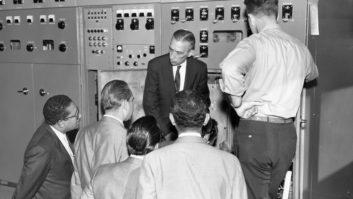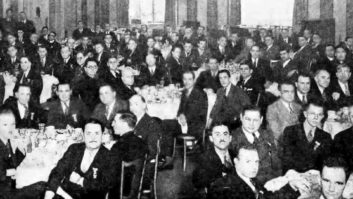Not all that long ago, NAB ran a course at Purdue University for broadcast engineering managers. No one was worried about lack of technical skills and nothing digital ran fast enough to do more than print out one page at a time on something that looked and worked like a glorified typewriter. Traffic led the digital way using what was essentially a very expensive word processor with a tiny added brain to calculate times and sort.
What managers did worry about were people skills. Engineering had grown into departments and groups in need of management and some engineers had even become general managers. On balance, they were not very good at it.
Who becomes a station general manger is both fascinating and telling. It has also changed over time. At first, it was not uncommon for engineers to be the station manager or owner. GMs tend to come from the most important functional area and at first, getting on the air, then staying on the air was the big challenge.
In the depression, sales managers became GMs, largely because staying on the air wasn�t so much a technical challenge as it was a financial challenge.
Sales people are often difficult GMs because, like engineers, their skill set doesn�t necessarily make them good overall managers. For example, a trait that is necessary for a salesperson is the ability to shrug off rejection without emotional cost. Shrugging off the rejection of a station�s staff being held back from making improvements isn�t a strategy for success.
In the better days that followed World War II, GMs could come from anywhere. It turns out that the decision-making and leadership skills exist in parallel to other skills without direct connection. Anyone might become a great GM.
Human resource managers, business managers, even an occasional program director has served as a GM. Some of the best GMs had worked in other media and a few in no media at all. America was in so many ways the world leader in leadership and management in all of its endeavors. Universities taught management and studied leadership. Every month, a new book on management hit the top of the bestsellers list and for a few months took its position revealing the new one and true secret to success.
Today, consolidation has created large tribes of stations where each station looks more or less alike. The GM is more a function of corporate culture than anything else. Groups focused on news will have a news director at the helm of each station giving them the power of having in effect dual news directors. More investment-oriented groups will have business managers across the board in the GM slot. Others will manage their stations with sales managers setting the pace. Special message stations and groups will have true believers in charge.
Engineering isn�t the only function in a station that is nearly invisible, but the reality is that no group of any size is dominated by engineering.
There is little chance that an engineer will be a station GM, unless the station is very small or they own it (which generally means it is a small station). Engineering is an empire of equipment, rather than of people. As broadcasting virtualizes, it seems likely that it becomes an empire of software that lives in the cloud.
Engineers, on balance, probably aren�t any better at those soft skills today.
The old NAB course, once supported by broadcast owners, faded away in time. Ownership changed as the era of first-generation owner/operator broadcasters (who had to work with their engineers or be engineers themselves) was replaced by investors who hired people to manage their properties. In most of the industry, investing in engineering people management skills was supplanted by the need for project management and technology management skills. Engineers didn�t get any better at soft skills. It�s a cruel reality that a mind with the knack for technology often has little patience for and understanding of the rest of humanity. Nonetheless, the management training came back, not because broadcast owners at NAB thought it a good idea, but because engineers did. Of course, the direct offspring of the NAB engineering management series is now the SBE�s. No one can teach anyone how to manage, in particular in a day or a week. On the other hand, no one who took the Purdue engineering management course and courses (there are several levels) likely escaped without profound changes in how they approached managing and being managed.
The Wandering Engineer is an industry stalwart who has been in broadcasting since the days of Marconi and Tesla. He gives his thoughts on the current state of broadcast engineering and the broadcast engineer.












